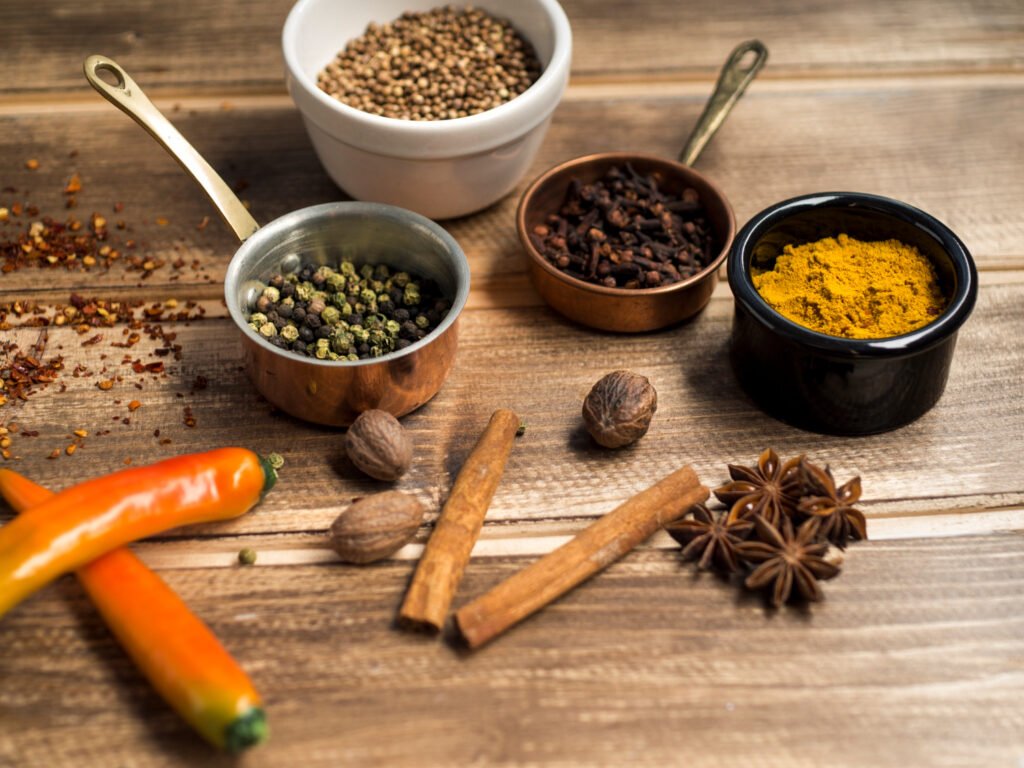
In this article
Overview
Weight loss can often seem like an uphill battle, especially when it involves strict diets and rigorous exercise routines. But what if there was a more flavorful way to support your weight loss journey? Enter the world of herbs and spices. These kitchen staples are more than just flavor enhancers; they’re packed with powerful compounds that can help boost metabolism, curb cravings, and promote fat burning. Integrating these natural wonders into your diet could be the key to unlocking a more sustainable and enjoyable weight loss experience
Why Herbs and Spices Matter in Weight Loss
While it’s true that maintaining a calorie deficit is crucial for weight loss, it’s not the only factor to consider. A holistic approach—one that includes a balanced diet, regular exercise, and lifestyle changes—tends to be more effective in the long run. Herbs and spices can play a significant role in this process by offering natural support to your body’s weight management mechanisms. Research has shown that many herbs and spices have properties that may aid in weight loss by boosting metabolism, reducing appetite, and enhancing fat oxidation.
Let’s delve into some of the most potent herbs and spices that can help you shed those extra pounds.
The Power Players: Top Herbs and Spices for Weight Loss
1. Fenugreek: The Appetite Suppressant
Fenugreek, a spice derived from the seeds of the Trigonella foenum-graecum plant, is known for its medicinal properties. Its high fiber content helps suppress appetite, making you feel full longer. Studies on mice have shown that fenugreek can significantly reduce body weight and fat accumulation. This is due to its ability to improve insulin sensitivity and reduce inflammation, both of which are critical in managing weight.
How to Use: Fenugreek can be used in a variety of dishes, from curries to teas. However, it’s important to note that some people may experience side effects like bloating or low blood sugar. Always consult your healthcare provider before adding it to your diet.
2. Ginseng: The Metabolism Booster
Ginseng, a staple in traditional Chinese medicine, is revered for its ability to boost energy and improve overall well-being. When it comes to weight loss, ginseng’s bioactive compounds, particularly ginsenosides, can help regulate appetite and enhance fat metabolism. Research suggests that ginseng can reduce food intake by controlling the appetite hormone leptin and decreasing glucose absorption in the gut.
How to Use: Ginseng can be consumed as a tea or taken in supplement form. While it generally has few side effects, it’s still advisable to discuss its use with a healthcare professional, especially if you’re on medication.
3. Cayenne Pepper: The Calorie Burner
Cayenne pepper, famous for its fiery flavor, contains capsaicin—a compound that has been shown to increase the number of calories burned daily. Capsaicin works by raising your body temperature, a process known as thermogenesis, which boosts metabolism and promotes fat burning.
How to Use: Sprinkle cayenne pepper on your meals, from eggs to soups, for a metabolism-boosting kick. Start with small amounts to assess your tolerance, as it can be quite spicy!
4. Black Pepper: The Fat Blocker
Black pepper, often called the “king of spices,” contains piperine, a compound that not only gives it its distinctive taste but also offers significant weight loss benefits. Piperine has been shown to block the formation of new fat cells, a process known as adipogenesis, thereby helping prevent weight gain.
How to Use: Black pepper is incredibly versatile and can be added to almost any dish, from salads to main courses. Its subtle heat enhances flavor while supporting your weight loss goals.
5. Turmeric: The Inflammation Fighter
Turmeric is widely celebrated for its anti-inflammatory properties, thanks to its active compound curcumin. Chronic inflammation is a common issue in obesity and can hinder weight loss. Curcumin not only helps reduce inflammation but also improves insulin sensitivity and regulates fat metabolism.
How to Use: Incorporate turmeric into your diet by adding it to soups, stews, or smoothies. Its warm, earthy flavor pairs well with a variety of foods, making it an easy addition to your daily routine.
6. Cinnamon: The Blood Sugar Regulator
Cinnamon isn’t just a warm, aromatic spice; it’s also a powerful tool in managing blood sugar levels. By mimicking the effects of insulin, cinnamon helps transfer sugar from the bloodstream into the cells, reducing the risk of fat accumulation. Additionally, it can slow the breakdown of carbohydrates, keeping you fuller for longer and helping curb those pesky sugar cravings.
How to Use: Sprinkle cinnamon on oatmeal, yogurt, or even in your coffee. Its sweet flavor makes it a versatile addition to both sweet and savory dishes
Herbs to Consider
- Ginger: Known for its thermogenic properties, ginger helps boost metabolism and burn fat. It also aids digestion, which can further support weight loss.
- Oregano: This herb contains carvacrol, a compound that may help reduce body fat by influencing the genes and proteins that control fat synthesis.
- Cumin: Studies suggest that cumin can significantly accelerate weight loss when added to the diet, possibly due to its role in enhancing fat breakdown.
- Garlic: Not only does garlic add flavor to your dishes, but it also boosts metabolism and supports fat burning, making it a valuable addition to any weight loss regimen.
- Caralluma Fimbriata: An edible succulent from Asia, Caralluma fimbriata is known for its appetite-suppressing properties, particularly effective in reducing belly fat.
- Gymnema Sylvestre: This herb is particularly useful for those who struggle with sugar cravings. It contains gymnemic acid, which can reduce the sweetness of foods, helping to curb your appetite.
How to Safely Incorporate Herbs and Spices into Your Diet
While the potential benefits of herbs and spices for weight loss are impressive, it’s important to approach their use with caution. Always start with small amounts to gauge your body’s response, and consult with a healthcare provider, especially if you have underlying health conditions or are taking medications.
Also, prioritize high-quality, organic spices and herbs, as they tend to be more potent and free from harmful additives.
The Takeaway
Herbs and spices offer a natural, flavorful way to support your weight loss efforts. From boosting metabolism to curbing appetite, these powerful plants can play a significant role in your weight management strategy. However, they are not a magic bullet. For the best results, incorporate them into a balanced diet, regular exercise routine, and healthy lifestyle.
Remember, sustainable weight loss is a journey that requires a multifaceted approach. So, why not make that journey a little more enjoyable by spicing it up? Whether you’re sprinkling turmeric on your veggies or adding a dash of cayenne to your soup, these natural flavor enhancers can be your secret weapon in the fight against unwanted pounds.
Reflect and Act
As you consider incorporating these herbs and spices into your diet, take a moment to reflect on your overall weight loss strategy. Are there areas where you could make healthier choices? Could you benefit from more physical activity or better stress management? Use this information as a springboard to optimize your approach, ensuring that your weight loss journey is as enjoyable and effective as possible
A Quick Review
Incorporating herbs and spices into your diet can naturally support your weight loss journey. Powerful options like fenugreek, cayenne pepper, and turmeric offer benefits such as appetite suppression, metabolism boosting, and inflammation reduction. While these spices enhance flavor, they also provide health benefits that can complement a balanced diet and exercise routine. However, it’s essential to use them wisely and consult with a healthcare provider to ensure they suit your individual needs.
Frequently asked questionsay
1. Can herbs and spices alone help me lose weight?
No, while herbs and spices can support weight loss by boosting metabolism and reducing appetite, they should be part of a balanced diet, regular exercise, and a healthy lifestyle.
2. How much of these spices should I use daily?
The amount varies depending on the spice and your individual health needs. Start with small amounts and consult a healthcare provider for personalized advice.
3. Are there any side effects to using these spices for weight loss?
Some people may experience side effects like bloating or low blood sugar, especially with spices like fenugreek or ginseng. Always start with small doses and consult your healthcare provider.
4. Can I take these herbs and spices as supplements?
Yes, many herbs and spices are available in supplement form. However, it’s important to choose high-quality supplements and consult a healthcare provider before use.
5. How long does it take to see results from using herbs and spices for weight loss?
Results vary depending on factors like diet, exercise, and individual metabolism. Herbs and spices should be viewed as a long-term, supportive addition to your weight loss plan.












